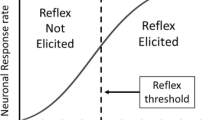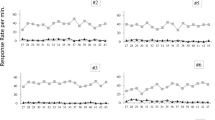Abstract
Contingengy-specifying stimuli (CSSs) can function differently than discriminative stimuli. Rather than evoking behavior due to a history of discrimination training, they alter the function of other stimuli and, therefore, the behavioral relations involving those stimuli. CSSs can alter the evocative function of discriminative stimuli, establishing operations, and conditional stimuli, as well as the efficacy of reinforcing and punishing stimuli and of stimuli that can function in second-order respondent conditioning. The concept of function-altering CSSs has implications for such areas of interest as stimulus equivalence, the terminology involving “rules” and “rule-governed behavior,” and the way in which behavior analysts view the effects of such basic processes as reinforcement and punishment.
Similar content being viewed by others
References
Brownstein, A. J., & Shull, R. L. (1985). A rule for the use of the term, “rule-governed behavior”. The Behavior Analyst, 8, 265–267.
Catania, A. C., Matthews, B. A., & Shimoff, E. (1982). Instructed versus shaped human verbal behavior: Interactions with nonverbal responding. Journal of the Experimental Analysis of Behavior, 38, 233–248.
Galizio, M. (1979). Contingency-shaped and rule-governed behavior: Instructional control of human loss avoidance. Journal of the Experimental Analysis of Behavior, 31, 53–70.
Hayes, S. C., Brownstein, A., Zettle, R. D., Rosenfarb, I., & Korn, Z. (1986). Rule-governed behavior and sensitivity to changing contingencies. Journal of the Experimental Analysis of Behavior, 45, 237–256.
Martin, G., & Pear, J. (1983). Behavior modification: What it is and how to do it (2nd ed.). Englewood Cliffs, NJ: Prentice-Hall.
Michael, J. (1980). On terms: The discriminative stimulus or SD. The Behavior Analyst, 3, 47–49.
Michael, J. (1982). Distinguishing between discriminative and motivational functions of stimuli. Journal of the Experimental Analysis of Behavior, 37, 149–155.
Michael, J. (1983). Evocative and repertoire altering effects of an environmental event. VB News, 2, 21–23.
Reynolds, G. S. (1975). A primer of operant conditioning. Glenview, Illinois: Scott, Foresman.
Rilling, M. (1977). Stimulus control and inhibitory processes. In W. K. Honig & J. E. R. Staddon (Eds.), Handbook of operant behavior (pp. 432–480). Englewood Cliffs, NJ: Prentice-Hall.
Shimoff, E., Catania, A. C., & Matthews, B. A. (1981). Uninstructed human responding: Sensitivity of low-rate performance to schedule contingencies. Journal of the Experimental Analysis of Behavior, 36, 207–220.
Sidman, M. (1960). Tactics of scientific research. New York: Basic Books.
Sidman, M., & Tailby, W. (1982). Conditional discrimination vs. matching-to-sample: An expansion of the testing paradigm. Journal of the Experimental Analysis of Behavior, 37, 5–24.
Skinner, B. F. (1953). Science and human behavior. New York: The Free Press.
Skinner, B. F. (1957). Verbal behavior. Englewood Cliffs, NJ: Prentice-Hall.
Skinner, B.F. (1969). Contingencies of reinforcement: A theoretical analysis. Englewood Cliffs, NJ: Prentice-Hall.
Skinner, B. F. (1974). About behaviorism. New York: Alfred A. Knopf.
Vaughan, M. E. (1985). Repeated acquisition in the analysis of rule-governed behavior. Journal of the Experimental Analysis of Behavior, 44, 175–184.
Author information
Authors and Affiliations
Rights and permissions
About this article
Cite this article
Schlinger, H., Blakely, E. Function-Altering Effects of Contingency-Specifying Stimuli. BEHAV ANALYST 10, 41–45 (1987). https://doi.org/10.1007/BF03392405
Published:
Issue Date:
DOI: https://doi.org/10.1007/BF03392405




